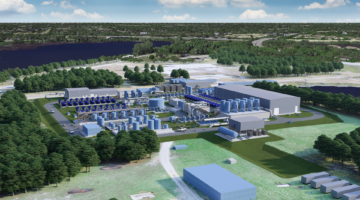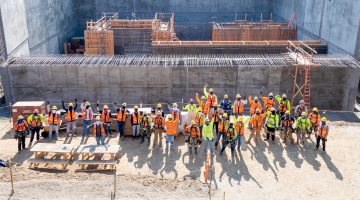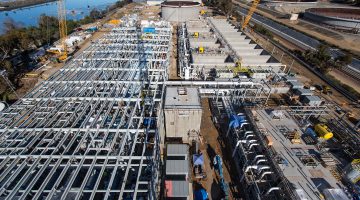
Accelerating the Development of Water and Wastewater Projects
It’s no secret that water and wastewater utilities face several complex challenges. There’s the perpetual aging infrastructure problem and growing …
To maximize constructability, timing matters — especially in the early stages of project development. Bringing construction, engineering, procurement and design experts to the table earlier helps identify potential issues that may arise in the field and drive innovative, cost-saving solutions.
Traditional bid-build contracts have been a mainstay in construction for decades. However, other project delivery models can offer worthwhile benefits to project owners. Each model brings its own distinct advantages and opportunities to influence cost, schedule and risk mitigation.
A single entity is responsible for both design and construction and is typically selected when design is approximately 30 percent complete.
A turnkey solution in which a single entity is responsible for the design, procurement of materials and construction of a project.
A private company partners with a public agency to finance, design, build and/or operate a project.
A design builder is selected earlier in the process, often using qualifications-based criteria.
A single entity is selected to advance the project design to approximately 60 percent. The contractor then provides a final price, in which the project owner has the option to accept and proceed.
All project stakeholders (e.g., owner, designer, constructor) work collaboratively to establish a scope of work, develop and finalize design and build the project.
The ability to eliminate uncertainty by doing upfront work allows for more flexibility in the early stages of a project before even breaking ground. Designs can be updated and changed in stages during preconstruction to better de-risk a project’s outcome.
During the preconstruction phase of alternative delivery models, the parties involved can collaboratively assess the terrain to ensure a better design fit and provide more accurate estimates throughout the various stages, giving peace of mind as the contractors break ground during construction.
At Kiewit, our goal is to provide solutions to client challenges and make their ideas a reality. Our experienced construction, procurement, and engineering teams get engaged early on to identify project needs and ways to mitigate risk and improve cost and schedule.
In Progress Design-Build (PDB), the project owner selects a design-build contractor using a competitive qualifications-based procurement process. An initial contract is established between the owner and the contractor who work collaboratively to progress the design. Once the design is 60 to 75 percent complete, the owner and contractor will negotiate a guaranteed maximum price (GMP). The model can offer more overall cost certainty since any budgetary concerns are addressed during preconstruction before a GMP is finalized.


With a single entity handling both design and construction, experienced design-builders can bring cost certainty and innovation, reduce project scheduling and provide a single point of accountability for the owner. Self-performing design-builders like Kiewit offer additional benefits including expertise, control, risk mitigation and value engineering ideas.
Engineering, procurement, and construction (EPC) delivery models are ideal for turnkey projects. This model can be more efficient and reduce risk for complex projects, as the EPC contractor handles scope definition, procurement and construction. An EPC contractor can provide detailed planning, resource procurement, construction, final preparation, and project handoff services, and may offer in-house fabrication capabilities to streamline the procurement process.


Construction-Manager-At-Risk (CMAR) integrates the owner, designer and constructor into one team to develop the most efficient cost and schedule. A great solution into alternative project delivery for traditional bid-build owners, these contracts mirror the benefits of early contractor involvement and qualifications-based selection but split the responsibility and the contracts between a design partner and a construction partner.

It’s no secret that water and wastewater utilities face several complex challenges. There’s the perpetual aging infrastructure problem and growing …

Plans are underway for a new drinking water treatment plant in Fort Lauderdale, Fla. that will replace an existing 70-year …

Using a relatively new Progressive Design Build (PDB) contract model led to increased collaboration, more innovative solutions, better designs and …

In the Northwest Territories, Canada, in a remote and breathtakingly beautiful place, Peter Kiewit Sons ULC is making history for …

As water/wastewater projects continue to increase in complexity, collaborative delivery methods for project execution are becoming increasingly favored among clients. …

This article was recently published on the Water Design Build Council (WDBC) blog on March 24, 2020 and a synopsis …
With nearly 140 years of experience self-performing the vast majority of our work, Kiewit has the expertise and resources to handle complex, innovative projects with proven expertise in established and emerging contract models.